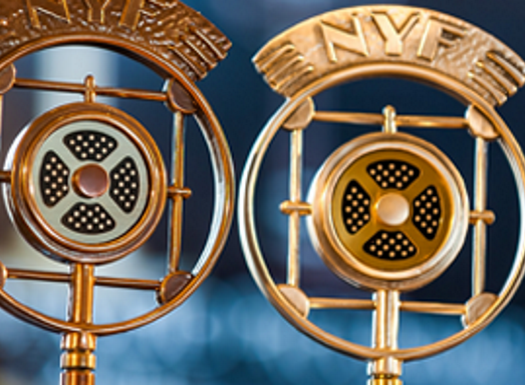New York Festivals 2018 Radio Awards Grand Jury is comprised of respected content creators and broadcast executives dedicated to providing outstanding content to their listeners.
The journalistic process of gathering information, researching, writing and presenting news stories and documentaries requires a dedicated unbiased and ethical professional, professionals like the executives on NYF’s Radio Awards Grand Jury. With 1/3 of the Radio competition’s categories devoted to news and journalism, these categories honor stories taking place on the world stage.
This week’s Grand Jury Spotlight features a round-table discussion with award-winning jurists: Havoc Franklin, Radio Manager for the Canadian Broadcasting Corporation Canada; Kim Fox, Associate Professor of Practice, Department of Journalism and Mass Communication, School of Global Affairs and Public Policy, The American University in Cairo; Juan Pablo Córdoba, Productor Artístico for Radio Mitre S.A; Nick Davis, Manager of Program Development for the Canadian Broadcasting Corporation; Simon Hollis, Head of Brook Lapping Radio UK; Vallerie Geller, President of Geller Media International USA; Astha Mandiratta, National Head – Client Solutions for ETV News Network India; Jon Tjhia, Senior Digital Editor the Wheeler Centre Australia; Philip Coulter, Producer, CBC Radio “Ideas” documentary unit, Tandem Projects Canada; and Kaushik Dutta is a consultant for Radio City 91.1 FM India.
New York Festivals: What is the responsibility of journalists in today’s world?
Havoc Franklin: I think that the responsibility of a journalist today is essentially the same as the responsibility of a journalist 50 years ago. True treatments, platforms, complexities, speed, revenue models have changed but at the heart of all good journalism is research, integrity, drive to find out and ability to communicate so that it connects and resonates with audiences. The role and responsibility of a journalist in a democratic society is just as significant today as it was before. That independence, that freedom to ask without fear of repercussion or death is still at the heart of a journalist’s role.
Kim Fox: Be vigilant despite the threats to press freedoms globally; The same tenets as always including seek the truth.
Juan Pablo Córdoba: The responsibility of journalists and all content creators is to pay attention to the pre-truth. The world is getting tired of the post-truth, it is necessary that we, as social communicators, show them also that instance prior to the news, where the human and the fact are, and nothing there is still corrupted.
Nick Davis: From a technical point of view, journalists are responsible for filing stories on multiple platforms – digital, television, radio and social media. From a practical point of view, journalists are responsible for telling the truth. The same thing they were charged with at the beginning of journalism. And the truth should help people have a better understanding of the world we live.
Simon Hollis: The same as always – to tell the truth, be critical, challenge consensus and not be cowed, especially by the toxic term ‘fake news’ which is aimed at discrediting any journalism that certain regimes don’t like.
Valerie Geller: Tell the truth, make it matter and NEVER be boring!
Astha Mandiratta: It is too big a question to answer, with current scenario journalist’s play a very crucial role, as viewers analyze news through the journalists’ eye. It is important that unbiased news with complete transparency is offered to listeners/viewers. Also, as journalists, it’s our responsibility to not to run after “Breakings” but be a little more sensitive and rational towards issues pertaining to society.
Jon Tjhia: I think journalists have always – and should always – have a responsibility to veracity. To me, that’s the fundamental, definitional quality of journalism. If you don’t, that’s fine!
Write your columns, feature articles, scripts, claim whatever the correct title of your profession is. (No big deal!) Discern the question, or the questionable thing, and scratch at it. Do they have a responsibility to be entertaining? No! I really don’t think so. If they don’t connect properly to their audiences, though, that’s on editors. Editors really, really matter. Aaaand scene.
Philip Coulter: To hold up a candle in a dark place; the same as anyone else.
Kaushik Dutta: I have a single sentence answer to this question, “a journalist just needs to REPORT, a journalist is not a storyteller”. If you like to narrate stories, please write a book, don’t be a journalist.

